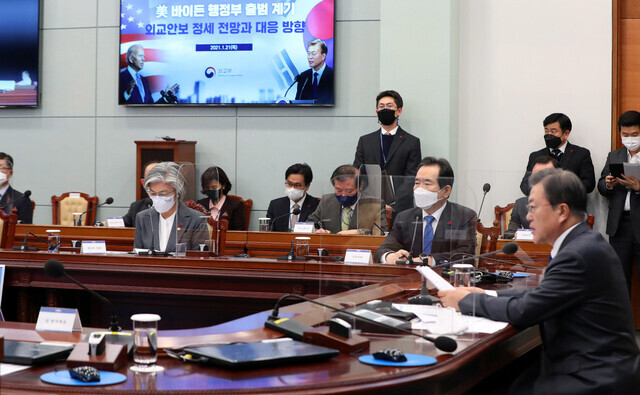Moon instructs diplomatic, foreign security lineup to reinvigorate inter-Korean, US-N. Korea dialogue
전체 맥락을 이해하기 위해서는 본문 보기를 권장합니다.
He also stressed that the "Korean Peninsula peace process is not a choice, but a path that we must take."
He added that the South Korean government would "continue responding more actively and assertively to the changing international order and security environment based on a robust South Korea-US alliance, while developing that alliance into a more comprehensive and reciprocal alliance of responsibility."
이 글자크기로 변경됩니다.
(예시) 가장 빠른 뉴스가 있고 다양한 정보, 쌍방향 소통이 숨쉬는 다음뉴스를 만나보세요. 다음뉴스는 국내외 주요이슈와 실시간 속보, 문화생활 및 다양한 분야의 뉴스를 입체적으로 전달하고 있습니다.

President Moon Jae-in directed government agencies involved in foreign affairs and national security to come up with new ways of breaking North Korea-US and inter-Korean dialogue out of their deadlock.
While receiving operational reports at the Blue House on Jan. 21 from the Ministry of Foreign Affairs (MOFA), the Ministry of Unification (MOU), and the Ministry of National Defense (MND), Moon urged them to “do your best to get the peace clock turning again by quickly bringing an end to the long impasse we’ve experienced since the Hanoi summit [in February 2019 between North Korea and the US] broke down.” Moon also urged them to develop new methods to achieve breakthroughs in North Korea-US and inter-Korean dialogue.
“Without being too hasty, I want you to look at this as the last year given to our administration,” he said, calling on the ministries to “cooperate more proactively in establishing a driving force for progress in inter-Korean relations and the peace process as masters of the Korean Peninsula’s destiny.”
He also stressed that the “Korean Peninsula peace process is not a choice, but a path that we must take.”
“Where there’s a will, there’s a way,” he added.
Moon additionally stressed the importance of cooperation with the newly inaugurated Joe Biden administration in the US.
“The government will continue working closely with the new Biden administration in the US to achieve progress with the Korean Peninsula peace process, while doing its very best with North Korea so that we can return to a path of dialogue and cooperation,” he said.
He added that the South Korean government would “continue responding more actively and assertively to the changing international order and security environment based on a robust South Korea-US alliance, while developing that alliance into a more comprehensive and reciprocal alliance of responsibility.”
He also stressed the importance of friendly relations with China, Japan, and other neighbors. In China’s case, he noted the laying of “groundwork for proceeding toward a more advanced relationship as we celebrate 30 years of diplomatic relations next year.” In Japan’s case, he called for an approach of “developing into a future-oriented relationship,” adding that this year’s Summer Olympics in Tokyo “need to be regarded as an opportunity for improving South Korea-Japan relations and advancing peace in Northeast Asia.”
The operational reports were held in conjunction with a plenary session of the National Security Council. In addition to Moon, the meeting was attended by Prime Minister Chung Sye-kyun, National Intelligence Service Director Park Jie-won, and National Security Office Director Suh Hoon, First Deputy Director Seo Ju-seok, and Second Deputy Director Kim Hyeong-jin. Reports were given by Minister of Foreign Affairs Kang Kyung-wha, Minister of Unification Lee In-young, and Minister of National Defense Suh Wook.
By Lee Wan, staff reporter
Please direct comments or questions to [english@hani.co.kr]
Copyright © 한겨레. 무단전재 및 재배포 금지.
- 서울역 ‘노숙인과 신사’ 어떻게 촬영했냐면요
- 유시민 “검찰, 노무현재단 계좌 사찰 사실 아냐” 사과
- 일본 정부 ‘올림픽 취소 내부결론 보도’ “그런 사실 없다”
- [ESC] 미국엔 있고, 우리는 없다? 엉큼한 서구 팁 문화
- 이낙연식 이이제이?…가덕도 방문 사진 속 비행기의 실체는
- 전인권, ‘조망권 시비’ 이웃집에 기왓장 던져…경찰 조사
- 성폭력 피해 의뢰인들 강제추행한 국선변호사 구속기소
- 바이든 “미국 입국자 출발 전 코로나 검사, 도착 후 격리”
- [ESC] “오늘은 뭐 하고 놀았어?” 남편 말 기분 나빠요
- 설 성수품 구입 비용, ‘전통시장 26만원’ ‘대형유통업체 36만원’